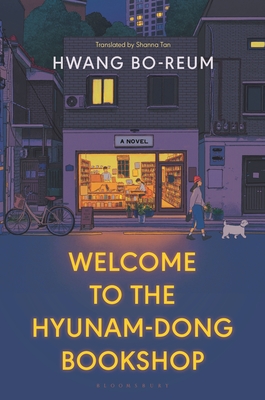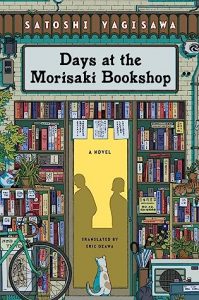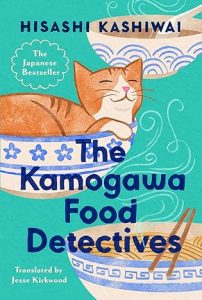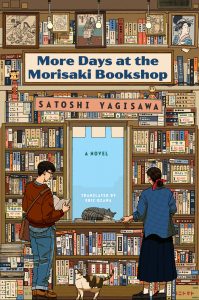 Welcome to the Hyunam-Dong Bookshop by Hwang Bo-reum, Shanna Tan
Welcome to the Hyunam-Dong Bookshop by Hwang Bo-reum, Shanna Tan Format: eARC
Source: supplied by publisher via Edelweiss
Formats available: hardcover, paperback, ebook, audiobook
Genres: books and reading, literary fiction, world literature
Pages: 320
Published by Bloomsbury Publishing on February 20, 2024
Purchasing Info: Author's Website, Publisher's Website, Amazon, Barnes & Noble, Kobo, Bookshop.org, Better World Books
Goodreads
The Korean smash hit available for the first time in English, a slice-of-life novel for readers of Matt Haig's The Midnight Library and Gabrielle Zevin's The Storied Life of AJ Fikry.
Yeongju is burned out. With her high-flying career, demanding marriage, and busy life in Seoul, she knows she should feel successful, but all she feels is drained. Yet an abandoned dream nags at her, and in a leap of faith, she leaves her old life behind. Quitting her job and divorcing her husband, Yeongju moves to a small residential neighborhood outside the city, where she opens the Hyunam-dong Bookshop.
For the first few months, all Yeongju does is cry, deterring visitors. But the long hours in the shop give her time to mull over what makes a good bookseller and store, and as she starts to read hungrily, host author events, and develop her own bookselling philosophy, she begins to ease into her new setting. Surrounded by friends, writers, and the books that connect them all, she finds her new story as the Hyunam-dong Bookshop transforms into an inviting space for lost souls to rest, heal, and remember that it's never too late to scrap the plot and start again.
My Review:
The title of the book makes the point of the story, as 30something, utterly stressed out Yeongju transforms herself into an independent bookstore owner in a close-knit but off the beaten path community.
Just as her high-pressure job and her equally pressured marriage once consumed Yeongju – sending her into a spiral of depression – opening the bookstore and returning to her childhood love of reading starts out as the antidote to those feelings.
Not that either the reader nor her concerned customers are entirely aware of that at first. We’re all aware of her depression, as her initial months of opening the store consist of her sitting on a stool inside the store with tears running down her face.
She’s clearly hit bottom in a whole lot of ways, but neither the reader nor her potential customers know precisely why. Not that her customers necessarily should, at least not until she’s willing to tell someone, but she’s drowning so hard that she’s closed off her internal life to the reader as well.
 Which is similar in a lot of ways to the opening of the utterly charming and absolutely marvelous Days at the Morisaki Bookshop – with one critical difference. The reader gets a much more thorough picture of that protagonist, Takako, and her internal, utterly depressed, life because even though Takako isn’t talking much her mother and her uncle talk at her, to her, and about her enough for the reader to see inside her slough of despond and start to feel for her even as she starts to pull herself out.
Which is similar in a lot of ways to the opening of the utterly charming and absolutely marvelous Days at the Morisaki Bookshop – with one critical difference. The reader gets a much more thorough picture of that protagonist, Takako, and her internal, utterly depressed, life because even though Takako isn’t talking much her mother and her uncle talk at her, to her, and about her enough for the reader to see inside her slough of despond and start to feel for her even as she starts to pull herself out.
At first, we know very little of what brought Yeongju to the bookshop or much of why she’s sitting in the midst of it weeping. But we do see the bookshop-owning butterfly emerge from her dark and tattered cocoon to take stock of the life she actually has and start looking towards its sustainability – for herself and for the people who come to see her bookshop as part of the warp and weft of their lives as much as she does.
And as Yeongju invests herself in welcoming others to the Hyunam-dong Bookshop, we finally begin to see glimpses of what drives her, what occasionally drives her back into her shell of depression, and the way that once she begins reaching out to others, they all begin to sustain each other.
 Escape Rating C: I fell in love with both last week’s The Kamogawa Food Detectives and Days at the Morisaki Bookshop and picked this up hoping for something similar – or even in a sweet spot in between the two.
Escape Rating C: I fell in love with both last week’s The Kamogawa Food Detectives and Days at the Morisaki Bookshop and picked this up hoping for something similar – or even in a sweet spot in between the two.
Sadly, that was not to be.
As much as I love books about books and reading, especially stories about bookstores and bookstore owners, I had a hard time getting into this one. It took me a while – entirely too long for the sake of my own personal reading schedule, in fact – to figure out that what was missing here that both of those books I hoped it would be a readalike for had was a central character or characters to carry the story.
Not that Yeongju isn’t there, but, well, for the first half of the book she really isn’t all there. She’s going through the motions, but we don’t see inside her nearly enough to be certain about what has brought her to that initial, depressing pass or get truly invested in how she gets herself out.
 As she comes back to herself, and the bookshop reaches out to its community and the wider world as a result, we do start getting glimpses into what brings the other characters in the story to become part of the shop and the stories within, but Yeongju uses the increasing busy-ness of the shop and the life she has focused around it as a way of not looking back at what brought her there in the first place.
As she comes back to herself, and the bookshop reaches out to its community and the wider world as a result, we do start getting glimpses into what brings the other characters in the story to become part of the shop and the stories within, but Yeongju uses the increasing busy-ness of the shop and the life she has focused around it as a way of not looking back at what brought her there in the first place.
In the end, this was okay but not what I was hoping for. It has some of the elements of the two books that brought me here, that journey from depression to healing through the power of books and reading and community that is at the heart of Days at the Morisaki Bookshop and the loosely linked slices of life stories of The Kamogawa Food Detectives, but it doesn’t have the strong, central linchpin character to carry the book as a whole the way that both of those books did.
Which leaves me looking forward that much more and harder to the follow-up to Days at the Morisaki Bookshop, titled More Days at the Morisaki Bookshop, coming in July. Because I do, still, very much, love books about books and reading and the transformative power of the two and have high hopes that the second book in that series will hit the same sweet spot as the first.
